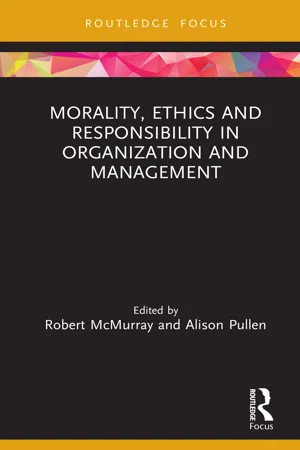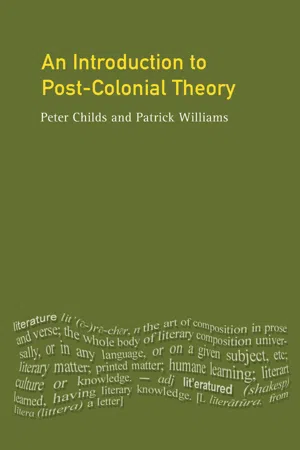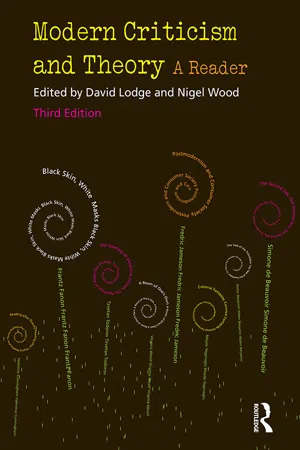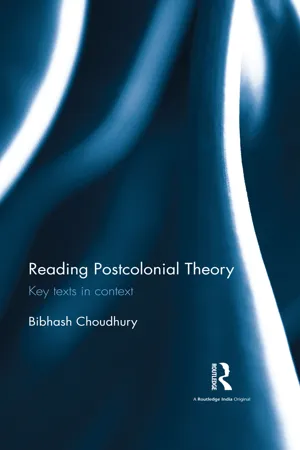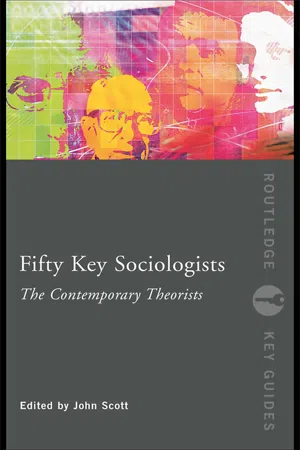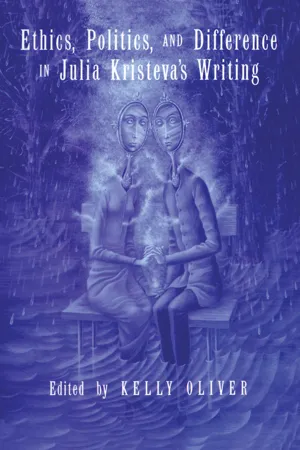Gayatri Spivak
Gayatri Chakravorty Spivak is a prominent postcolonial theorist known for her work on subaltern studies and deconstruction. She is recognized for her influential essay "Can the Subaltern Speak?" which examines the representation of marginalized voices in colonial and postcolonial contexts. Spivak's work has had a significant impact on critical theory, feminism, and postcolonial studies.
7 Key excerpts on "Gayatri Spivak"
- Robert McMurray, Alison Pullen(Authors)
- 2020(Publication Date)
- Routledge(Publisher)
...Within the Subaltern Studies Group, Spivak focused on developing the notion of the subaltern beyond Gramsci’s engagement to include those colonized people that were beyond the Western gaze and beyond history’s analytic categories, existing under conditions that could not be recognized through contemporary capitalism. In many ways, subaltern became an analytic category that spoke about those groups of people who had been left out of Marxist analysis and out of history in the context of South East Asia. In all, Spivak’s concepts of subaltern, strategic essentialism and the Other also capture and address issues related to agency and structure – a point that is relevant to her analyses about gendered and racialized labour in the context of globalization. While not representing the entirety of her scholarship, these concepts are foundational to her analyses derived from postcolonial, Marxist, deconstructionist and feminist philosophies. Guided by these concepts, the focus of this chapter is on how her interdisciplinary work and scholarship provide new directions for organizational thinking and the nexus of business and society. Specifically, I focus on contributions available from Spivak’s scholarship to notions of subjectivity, ethics and corporate governance in the context of globalization. Taken together, Gayatri Spivak’s intellectual contributions are well-poised to expand upon the repertoire of organizational theorizing that has long been dominated by masculinist paradigms that are not only blind to gender as an organizing principle of organizational life and society but also unrepresentative of the different experiences and views emanating from non-Western traditions and experiences. Intellectual contributions In general, postcoloniality has had a critical engagement with representations of the Third World/ Global South ‘Other’ in the Western discourse and text (Said, 1983, 1993/2012)...
- eBook - ePub
- Peter Childs, Patrick Williams(Authors)
- 2014(Publication Date)
- Routledge(Publisher)
...Chapter 5 Spivak and the subaltern Introduction Post-colonial studies has placed critical theory in a new context, challenging its precepts and its applicability outside the West. No critic better exemplifies this practice than Gayatri Chakravorty Spivak. 1 Without considering herself a critic of any one of these particular kinds, Spivak intervenes in feminist, Marxist, deconstructive, and psychoanalytic debates by testing their boundaries and foregrounding a post-colonial perspective. 2 Of her early essays, she says that she has tried to situate feminist literary criticism in a critique of imperialism. She speaks of imperialism rather than colonialism because one of her aims has been to broaden analyses of colonial discourse from reappraisals of nineteenth-century European territorial expansion into debates over neo-colonial relations, racism in the West, and the international division of labour. 3 Suspicious of single theoretical systems, large solutions, or grand narratives, she describes herself as a bricoleur, someone who uses the appropriate tools available to hand, and as an interventionist who focuses on small issues, local concerns. Rarely will she speak of feminism or Marxism without applying a situational label: French, Bengali, Anglo-US. Her most common concern is the position of the subject: the place from which someone addresses or conceives of an issue and formulates its areas of importance...
- eBook - ePub
- Phil Hubbard, Rob Kitchin(Authors)
- 2010(Publication Date)
- SAGE Publications Ltd(Publisher)
...Her doctoral dissertation was on the work of Irish poet W.B.Yeats, undertaken again at Cornell University, supervised by Paul de Man (1919–1983). Spivak was appointed Avalon Foundation Professor in the Humanities at the Department of English and Comparative Literature at Columbia University (New York) in 1992, alongside Edward Said (1935–2003). A frequent traveller and engaging guest speaker, Spivak is often invited to speak across many disciplines as well as outside the academy in activist circles and at literary events. A useful guide to her work begins by noting that: Gayatri Chakravorty Spivak is best known for her overtly political use of contemporary cultural and critical theories to challenge the legacy of colonialism on the way we read and think about literature and culture. What is more, Spivak’s critical interventions encompass a range of theoretical interests, including Marxism, feminism, deconstruction, postcolonial theory and cutting-edge work on globalization. (Morton, 2003: 1) Thus for many geographers and other scholars, the name of Gayatri Chakravorty Spivak is synonymous with deconstruction and post-colonial feminism. It is no secret, however, that Spivak’s work with its dense style sometimes promotes elitism or invokes dismissal. It certainly defies easy summary. Perhaps too there is sometimes an impression that those who are able to extract meaning from her works have gained access to a select circle of intellectuals who have demonstrated their intellectual capacity ‘to know’ by referencing Spivak (we will return to this issue of style later). Amongst her vast range of book-length published work is a translation into English and critical introduction to Jacques Derrida’s De la Grammatologie (1976); other works include In Other Worlds: Essays in Cultural Politics (1987); Outside in the Teaching Machine (1993); A Critique of Post-Colonial Reason (1999); and Other Asias (2005)...
- eBook - ePub
Modern Criticism and Theory
A Reader
- Nigel Wood, David Lodge(Authors)
- 2014(Publication Date)
- Routledge(Publisher)
...As she pointed out most forcibly in her 1981 essay, ‘French Feminism in an International Frame’ (first published in Yale French Studies, 62:154–84, and reprinted in In Other Worlds: essays in cultural politics [1987], pp. 134–53), the persistent deferring of meaning will not of itself ensure a more libertarian sexual politics or the dismantling of sexist sociopolitical structures. To begin to confront these issues from the widest available cultural perspective, one that would not, for example, ignore the voices of otherwise silenced Third World women, one would need to realize the possible antagonisms between feminist, marxist and deconstructive readings. Spivak was born in Calcutta and her earliest political affiliations were formed at the city’s Presidency College during the most intense student unrest. Graduating with an English degree, she continued her education in 1962 as a Comparative Literature doctoral student at Cornell University. The cultural diversity of her formal education allowed her frequently in her early work to unearth the deepest racial and gender assumptions in not only literary but also theoretical texts. Quite literally, the politically dispossessed could be voiceless, written out of the historical record largely because the traces of their activity were regarded as non-cultural or, at least, without structure, and thus without volition. This perspective Spivak called a ‘subaltern’ one. In her seminal, ‘Can the Subaltern Speak? Speculations on Widow Sacrifice’ (first published in the magazine Wedge (1985, reprinted in Marxism and the Interpretation of Culture [1988], ed. Cary Nelson and Lawrence Grossberg), she illustrates how an exclusively textual route towards understanding non-Western customs is doomed only to replicating occidental patterns of understanding: ‘There is no space from where the subaltern (sexed) subject can speak’ (Wedge, p. 122)...
- eBook - ePub
Reading Postcolonial Theory
Key texts in context
- Bibhash Choudhury(Author)
- 2016(Publication Date)
- Routledge India(Publisher)
...And further complicated is the status of the ‘subaltern subject’, one whose inability to articulate brings forth new advocates, and vocabularies that aspire to speak on such a subject’s behalf. ‘Can the Subaltern Speak?’ is a response to the Subaltern Studies Collective led by Ranajit Guha, and this is one question, Spivak contends, any engagement with the subject must face, and answer. This essay, therefore, turns the analytical project on its head and drawing upon the resources of deconstruction and Marxism, she invites us to attend to the faultlines that stare at us even as we consider the possibility of engaging with subaltern experience. If the subaltern subject is situated on the very margins of the text that we encounter as history, what about the ‘woman’ subject inscribed within such a bracket, asks Spivak: ‘Within the effaced itinerary of the subaltern subject, the track of sexual difference is doubly effaced’ (287). This then is a matter that must be taken up by the subaltern historians, and they must take it head on; the problem, however, is of another kind: with their awareness of such space and what its character may entail for the articulation of critical discourse, the postcolonial thinkers associated with such a project find themselves in a tight spot; they find this ‘privilege is their loss’ (287). At the end of the essay when Spivak says with grim finality that the ‘subaltern cannot speak’ (307), she is, as she points out, taking off from the Derridean caution that appropriation of the other through assimilation is not only dangerous but also ineffective. Are postcolonial intellectuals alert to this trap, where privilege is also a challenge? Spivak’s argument for a critical vocabulary and a discourse that could attend to the subaltern as agency and as historical inevitability was, in fact, dealt with in the 12th essay in In Other Worlds, ‘Subaltern Studies: Deconstructing Historiography’, originally published in 1985...
- John Scott, John Scott(Authors)
- 2007(Publication Date)
- Routledge(Publisher)
...These were elaborated in her essay ‘Can the Subaltern Speak?’, which was originally published in the journal Wedge in 1985 and subsequently reprinted in 1988 in an edited collection of essays, Marxism and the Interpretation of Culture. The essay was an exceptional critique of the claims made by twentieth-century European intellectuals such as Michel Foucault and Gilles Deleuze to represent and speak on behalf of the marginalized and of the sanctimonious claims of British colonialists to save native women from the tradition of Hindu widow sacrifice in nineteenth-century India. Without a doubt this essay not only confronted the universal claims of western feminism; it also contested its paradigms and focus. More importantly, it created a space for self-reflexivity and brought forward critical scholarship on issues relating to race, class, sexuality, religion and culture. In her essay Spivak chides the political representations of ‘Third World’ women by western feminism, and her work has yielded a deeper ethical understanding of the power dimensions of ‘speaking positions’ and has also brought a richness and complexity to feminist theory. Despite this contribution there have also been contemptuous critiques of her famous essay. Spivak’s literary criticism is encapsulated in her essays ‘Imperialism and Sexual Difference’, ‘Three Women’s Texts and a Critique of Imperialism’ and ‘The Rani of Sirmur’. According to Spivak, literature and, indeed, its teaching have been pivotal in the construction and propagation of the colonial mission and she considers it of special importance that texts such as Charlotte Bronte’s Jane Eyre, Mary Shelley’s Frankenstein and Daniel Defoe’s Robinson Crusoe were permeated by colonial discourse...
- Kelly Oliver(Author)
- 2013(Publication Date)
- Routledge(Publisher)
...Gayatri Spivak, in an interview, urges us to shelve the question of essentialism. 4 Spivak says that she has “no time for essence/anti-essence,” while at the same time claiming to be “repelled by Kristeva's politics.” She “can't read her seriously anymore [ sic ]” because of Kristeva's “long-standing implicit sort of positivism”—her “naturalizing of the chora.” 5 What is it in Kristeva's politics that repels Spivak? Is she repelled according to the same schema within which she objects to the naturalizing of the chora ? Whatever naturalizing means, does it name anything different from the target of essentialist critiques? Is it certain that the outmoded functioning of the essentialist label as a taboo on the body has not left certain kinds of residues? Can the legacy of the essentialist critique be discerned in Spivak's objection to what she regards as Kristeva's naturalizing? The answers to such questions remain obscure so long as we fail to pay attention to the convoluted history of essentialism, and to the ways in which feminism itself, in different ways, is both implicated in essentialism, and generates various critiques of essentialism. We need to examine the ways in which the debate over essentialism is situated in terms of other motifs that have guided the development of feminism. We need to provide a his tory of the various ideological investments feminism has constructed for itself in legislating certain thinkers as essentialist and in attempting to maintain a place for itself outside that alleged essentialism...
